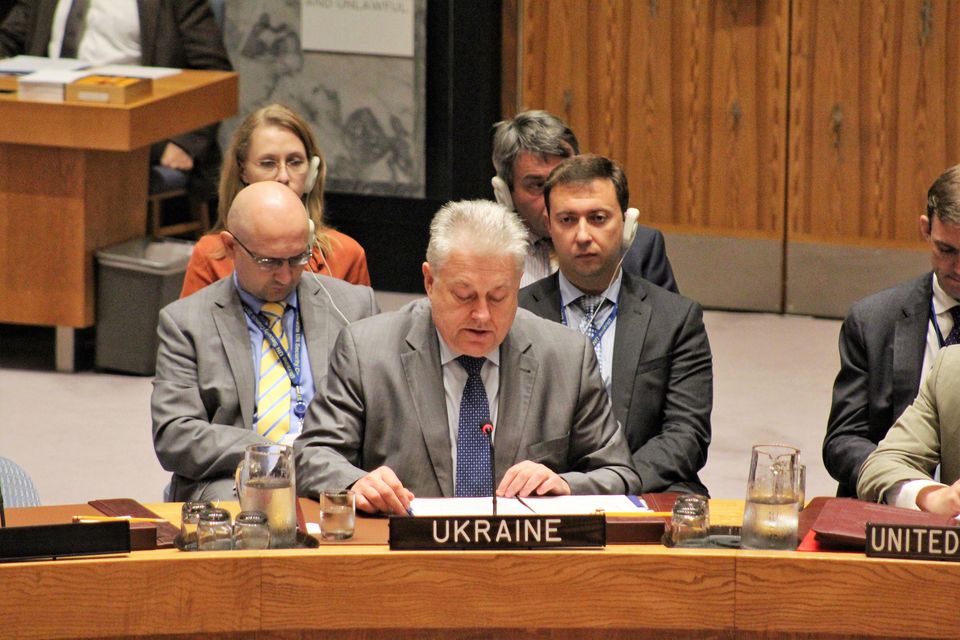Statement by the delegation of Ukraine at the UNSC meeting on threats to international peace and security caused by terrorist acts: aviation security

As prepared. Check against delivery.
Mr. President,
I would like to thank the Secretary-General of the International Civil Aviation Organization Dr. Liu and Chair of the UNSC Counter-Terrorism Committee Ambassador Aboulatta for their insightful briefings.
In light of evolving terrorist threats throughout the world, enhancement of aviation security worldwide is critical for keeping travelers safe and secure. Developing new standards of aviation security to eliminate terrorist threats to civil aviation is not just timely, but necessary. Yet, not all needed improvements to the aviation security can be made overnight — especially given that their implementation requires a phased approach with active engagement of all states.
Among the urgent tasks are the enhancement of overall security with advanced passenger screening systems; heightened screening of personal baggage, in particular electronic devices, to prevent improvised explosive devices being taken in the air; introduction of increased security protocols around aircraft; and establishment of additional pre-clearance locations.
Resolution 2309, which Ukraine cosponsored, sent a strong message to ICAO to further develop its cooperation with the Security Council, in particular the CTC and its Executive Directorate. This implies a systematic exchange of information on terrorist threats, incidents, trends and mitigation efforts, as well as providing capacity building assistance where it is needed most.
In this regard, we take positive note of the July’s CTC special meeting and the most recent 2017 ICAO Global Aviation Security Symposium held this September. These events facilitated strategic international collaboration on addressing the threat posed by terrorists targeting civil aviation by reinforcing, strengthening and promoting the international framework of aviation security standards. Their findings should be well reflected in national and international terrorism prevention strategies.
We, therefore, encourage ICAO and CTED to continue such cooperation, with an active involvement of the new UN Office of Counter-Terrorism.
Mr. President,
Driven by the requirements of resolutions 2309 and 2341 Ukraine has updated its State Programme on Civil Aviation Security in March 2017 in conformity with the recent amendments of ICAO’s Standards and Recommended Practices.
It sets forth a mechanism for risk assessment at the national level and at the airport level, introduces extensive measures related to the protection of civil aviation from acts of unlawful interference, and enacts in this regard the provision of specialized training for security personnel to promptly and effectively identify and eliminate threats to civil aviation.
Since a single cyber-attack could sometimes deal even more damage to the civil aviation system than any other terrorist attack, a special focus under the State Programme is given to the protection of critical airport infrastructure from cyber threats, as envisaged by the ICAO Assembly Resolution 39–19. A dedicated division was created within the State Aviation Service of Ukraine to coordinate cybersecurity strategies, policies, and plans with airline companies and share respective information to help identify critical vulnerabilities that need to be addressed.
To check the travelers’ information against the terrorist sanctions lists, Ukraine became a participant of the Advanced Passenger Information System and supports its universal implementation. In this vein, we also introduced ICAO compliant biometric travel documents and equipped our airports with automated systems for their checking.
Mr. President,
The gravity of acts threatening the safety of international civil aviation, especially terrorist attacks, makes them a matter of concern for the entire international community. States, therefore, should spare no effort to cooperate diligently with the aim of thoroughly investigating these crimes and holding their perpetrators to justice.
One of the examples that I have to mention is the downing of Malaysia Airlines flight MH17 in the occupied Ukraine’s Donbas.
The five countries — Australia, Belgium, Malaysia, The Netherlands and Ukraine — are already working together in the Joint Investigation Team (JIT) on the criminal investigation of that heinous crime. This investigation is still underway.
Being resolute to prosecute those responsible for the said atrocious crime under the most authoritative body, attempts were made by Ukraine and our partners to establish an international tribunal by the Security Council.
Yet, they were all blocked by the Russian Federation.
This summer the JIT countries decided that the prosecution and trial of the suspects would take place in the Netherlands.
Ukraine and the Netherlands signed a bilateral treaty on international legal cooperation in relation to the downing of flight MH17.
The treaty constitutes the legal basis for transferring the criminal proceedings from Ukraine to The Netherlands.
Last week, in the margins of the 72nd session of the UN General Assembly, the Ministers of the JIT countries signed the Memorandum of Understanding regarding political support for prosecuting the perpetrators of the downing of flight MH17.
By signing this agreement, we have pledged to continue working in partnership to implement the demand of UN Security Council resolution 2166 that those responsible for this incident be held to account.
Together with other JIT countries and with broad support from the international community, we will continue working tirelessly to ensure justice for victims and accountability for all responsible for this crime: for those, who supplied the BUK missile system that shot down MH17, who gave that criminal order, who pushed the button, who supported and funded terrorists then and who continue to do so until now.
We count on the backing of all states in this just cause.
Thank you for your attention.
